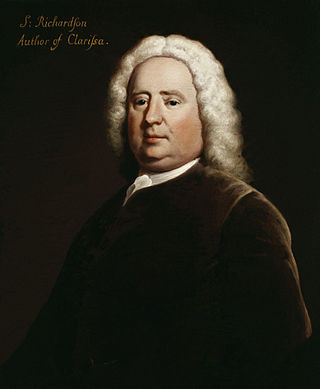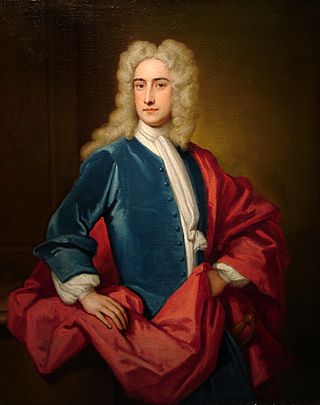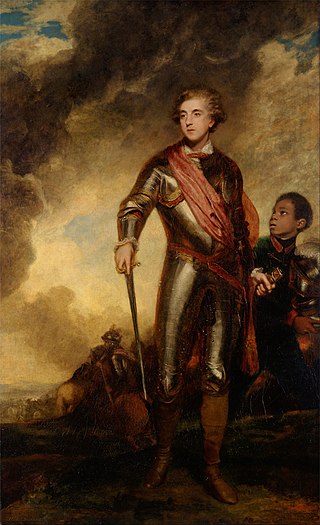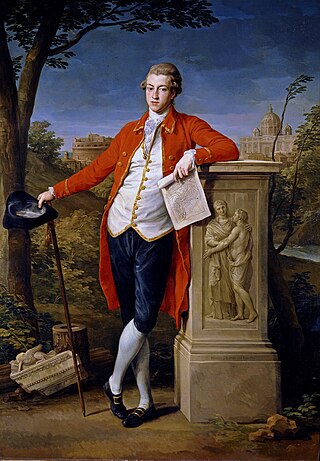Related Research Articles

Samuel Richardson was an English writer and printer known for three epistolary novels: Pamela; or, Virtue Rewarded (1740), Clarissa: Or the History of a Young Lady (1748) and The History of Sir Charles Grandison (1753). He printed almost 500 works, including journals and magazines, working periodically with the London bookseller Andrew Millar. Richardson had been apprenticed to a printer, whose daughter he eventually married. He lost her along with their six children, but remarried and had six more children, of whom four daughters reached adulthood, leaving no male heirs to continue the print shop. As it ran down, he wrote his first novel at the age of 51 and joined the admired writers of his day. Leading acquaintances included Samuel Johnson and Sarah Fielding, the physician and Behmenist George Cheyne, and the theologian and writer William Law, whose books he printed. At Law's request, Richardson printed some poems by John Byrom. In literature, he rivalled Henry Fielding; the two responded to each other's literary styles.

Sir Charles Hardy was a Royal Navy officer and politician who sat in the House of Commons between 1764 and 1780. He served as colonial governor of New York from 1755 to 1757.

Samuel Sandys, 1st Baron Sandys, was a British Whig politician who represented Worcester in the House of Commons from 1718 until 1743, when he was created Baron Sandys. He held numerous posts in the government of the United Kingdom, namely Chancellor of the Exchequer, Leader of the House of Commons, Cofferer of the Household and First Lord of Trade. He was also a justice in eyre.

William Eden, 1st Baron Auckland, PC (Ire), FRS was a British diplomat and politician who sat in the House of Commons from 1774 to 1793.

General Charles Stanhope, 3rd Earl of Harrington, styled Viscount Petersham until 1779, was a British Army officer and politician who sat in the House of Commons between 1774 and 1779 when he succeeded to the peerage as Earl of Harrington.

Charles Manners, 4th Duke of Rutland was a British politician and nobleman, the eldest legitimate son of John Manners, Marquess of Granby. He was styled Lord Roos from 1760 until 1770, and Marquess of Granby from 1770 until 1779.
Richard Muilman Trench Chiswell was an English banker, antiquarian and MP. He committed suicide after his bankruptcy.

Francis Basset, 1st Baron de Dunstanville, FRS was an English peer and politician who sat in the British House of Commons from 1780 to 1796.

Sir Richard Worsley, 7th Baronet,, of Appuldurcombe House, Wroxall, Isle of Wight, was a British politician who sat in the House of Commons between 1774 and 1801. He was a noted collector of antiquities.
Brigadier-General Richard Smith was Commander-in-Chief, India of the East India Company (Bengal).
Sir Edward Newenham (1734–1814) was an Irish politician.
Elizabeth Grenville was an English artist and writer. She was the wife of George Grenville, prime minister from 1763 to 1765; the daughter of Sir William Wyndham, a prominent Tory politician; and the mother of William Grenville, prime minister from 1806 to 1807.
Elizabeth, Lady Echlin was an English writer, best known for her correspondence with Samuel Richardson, and for writing an alternative and less shocking ending to his novel Clarissa.

Mothers of the Novel: 100 Good Women Writers Before Jane Austen (1986), by Dale Spender, is a foundational study for the reclamation project central to feminist literary studies in English in the late 1980s and 1990s.

Dorothy Bradshaigh, British letter writer and cookery book compiler. After her marriage she lived at Haigh Hall near Wigan. Her letters and suggestions to Samuel Richardson influenced his novel The History of Sir Charles Grandison.
References
- 1 2 3 4 Anna Lott, ‘Meades, Anna (bap. 1734, d. in or before 1779?)’, Oxford Dictionary of National Biography, Oxford University Press, 2004 accessed 2 April 2016
- ↑ World and Fashionable Advertiser (London, England), Thursday, January 18, 1787; Issue 16.
- ↑ Oracle and Public Advertiser (London, England), Monday, January 2, 1797; Issue 19 509.